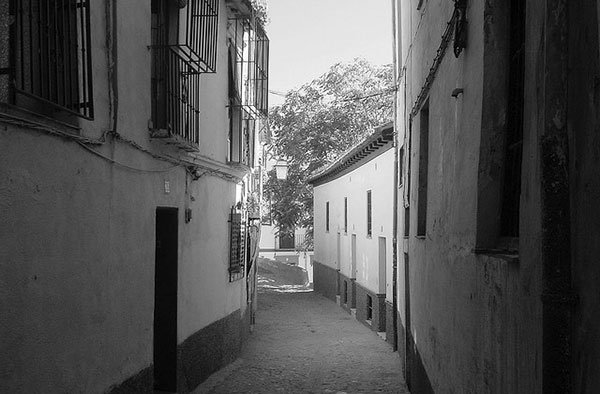Someone Speaks Your Name

In this excerpt from Luis García Montero’s third and latest novel, Someone Speaks Your Name, Granada is gray, sad, and frozen in time by Francisco Franco’s dictatorship. But García Montero’s protagonist, León Egea, is determined to forge his own brighter future, inspired by his love of literature and for a woman. Political awakening drives the momentum of the narrative, which explores the earliest tentative days of the dramatic transition to democracy that lies ahead.
The calendar in the bar is suspended in time and place. Nothing changes. No one can escape from here. It marks the 19th of April. It doesn’t mark the last eleven days of April or May or June. As Vicente Fernández would point out later, it hasn’t marked the last 256 days of 1960, or 1961, or 1962, or the 181 days of 1963. I prefer the arts to science, and I like to write out numbers with letters . . . although when I write poetry, I count out the syllables with numbers. We all exist in a suspension of time, eleven syllables, that’s a hendecasyllable. An angel with its tremendous wings for chains is another. Eleven syllables.
Today is the first of July of 1963. That antique calendar, practically prehistoric, is a good metaphor for how we live in a paralyzed nation. I guess I’ll be having coffee fairly often in the Lepanto Bar over the next three months. It’s right next door to the book publisher Universo, on Lepanto Street. My literature professor told me that learning to write is like learning to see, like sharpening your focus just enough so that what you are looking at becomes clear. I’m looking at a calendar whose dates have stopped changing, and I think of a dried-up nation, of a city that is hot and stunted, futureless. A wooden frame with slots, numbers for the days and tables for the months. I’m almost grateful for this old monstrosity of a calendar. The photos on the calendars that flood the bars and shops around here are revolting. At least here there aren’t any images of holy week processions, no virgins, no saints, no starlets, no tacky women posing with bottles of Soberano cognac, which is a man’s drink. I enjoy stealing the church’s capital letters. My literature professor says that to become a writer you need to choose your obsessions. It gives you personality, worldliness. Artists are obsessives. Juan Ramón Jiménez used to write “j” in words that everyone else spells with a “g”: antholojy, jeneration, relijion. It’s painful to look at, but that’s the point, to write and cause pain. I am the master of the premeditated spelling error. Some professors condemn my use of the lower case to write god. But that’s my obsession, my insolence. In my town, I’m infamous for my insolence. I want my writing to be infamous for insolence, too.
Time will not march on, and we will inhabit a Paleolithic city, dense and decapitated, a city with no future, riveted to a calendar that cannot move.
A monstrosity of a calendar with an air of dignity. But out of time. The Lepanto Bar fills up with seekers of water and coffee, Vicente Fernández greets them, people come and go, but there, inside, time stands still. We are suffering the heat and the drought of a Paleolithic summer, dense and decapitated. My literature professor likes Valle-Inclán because he produced unforgettable sets of three-word adjectives. Madrid was absurd, brilliant, and starving. The Marquise de Brandomín was ugly, catholic, and sentimental. Summertime in this city is like his life: withered, dense, and decapitated. Time will not pass, no one will pull pages off the calendar, we will continue in the same day, the same month, the same year. It doesn’t matter that a new school year is starting, that the cold is coming, that the mountains wake up white with snow, that my parents are getting older, that I’m shouldering more Latin and language history courses in the Department of Philosophy and Letters. Time will not march on, and we will inhabit a Paleolithic city, dense and decapitated, a city with no future, riveted to a calendar that cannot move.
That’s a pretty good metaphor to kick off my stories about this summer. Today, Monday, the first of July, 1963, I climbed the stairs to the Universo offices. Shadowy, worn, and asthmatic, that describes the stairs at Number Seven, Lepanto Street. I had a noon appointment with Vicente Fernández. The secretary, a pleasant woman, interrupted her phone call to tell me that Don Vicente had gone down for a coffee. She said I could wait for him there in his office or go look for him in the Lepanto Bar. I decided the bar was the more attractive option. The ceiling fan in the office served only to stir up sadness. The secretary needed to concentrate again on her conversation.
“Yes, you said you’re in Motril, right? Your name? Yes, please. Your telephone number? As soon as someone from sales is available he will contact you. Pardon? No, I don’t have that information, but . . . In half an hour. Of course. Thank you.”
A metallic bookshelf, walls with chipping paint, the smell of age and of yellowing paper, two closed doors, a secretary talking on the phone and a couple of armchairs too scary to sit in . . . no further reasons needed to go down and check out the bar. That and the fact that I didn’t have breakfast. My literature professor is partial to the intelligent use of humor when writing about pretty much anything. Go for the smile, even at the saddest moments. To write is to seduce. Humor with tears, humor with hunger and coffee with milk.
I went down to the bar to find the calendar waiting for me, suspended on the 19th of April 1960. What did I do on that day three years ago? My literature professor insists that to write is to negotiate with memory. I have a good memory; I’m no good at forgetting, I remember the favors and the offenses. My mother thinks that holding a grudge is for spiteful people. I’m not spiteful. I forgive, but I don’t forget. I don’t like Don Mateo, the professor who saw fit to throw me out of his class on the 19th of April 1960 because he had taken a dislike to me and he expelled me five and a half times during the two courses I suffered through with him. Five and a half times. One day he threw me out, then had a change of heart and followed me out into the hallway to ask me to come back.
“Come on, León, I don’t want to throw you out today. It’s your onomastic.”
I don’t know if it was the 19th of April 1959 or the 19th of April 1960. He expelled me from class and then pardoned me because it was my saint’s day, or my onomastic, as that pedant Don Mateo would say. I promise I won’t write the word onomastic again, ever. Farewell, onomastic, farewell. My saint’s day! Even those of us who don’t believe in miracles have to acknowledge the mysterious presence of luck. Farewell, Don Mateo, may you remain forever entombed in your university lecture hall; you can keep your onomastic and your expulsions, because now I’ve passed my first year at the university.
The absence of life walks out into the streets every day; it goes to work, to school, it has coffee in the bars, and it seeps into our bodies when we try to think or dream.
The waiter said he became a widower on the 19th of April 1960, and since then his life has lost all meaning. She died on my saint’s day. What are the chances? Still, I don’t associate that emptiness with death but rather with the absence of life. They’re not the same thing. The dead are in cemeteries, surrounded by flowers, and forgotten. The absence of life walks out into the streets every day; it goes to work, to school, it has coffee in the bars, and it seeps into our bodies when we try to think or dream. I’m not spiteful, but I won’t keep quiet. There are certain times when no one can shut me up. I haven’t been tamed like a mule, or like my father. I refuse to follow orders. My father curses the day he decided to name me León. He’s convinced that my name has shaped my character.
“So, you are León Egea Extremera.”
“Yes, Don Vicente.”
“You can drop the ‘Don.’ I’m going to be your colleague, more than anything else. The boss is Don Alfonso, but you won’t see much of him in the office this summer. Would you like a coffee?”
“Yes, and some toast. He seems like a good person . . . too good. One of those guys who never gets mixed up in problems.”
He met my literature professor when Universo published his book. It was a good connection that helped me get this summer job, a great opportunity that I really needed. That’s another thing I owe to his classes and his way of thinking. But I don’t think my professor and Vicente are actual friends, because their personalities are so different. This guy speaks, smiles, and holds his tongue with the respectful, somewhat tame manner of a salesman. He’s pleasant, he listens, he’s attentive, he tries to be agreeable, but when you start talking about your own life, some story or some event, he withdraws and says he doesn’t need to know about that. It must make him uncomfortable to share confidences with someone he just met.
I’m jotting down these memories of that meeting and my first conversation with him so I can develop a profile of my impressions. We sat at a table so I could eat my breakfast comfortably. The widowed waiter served me, on Vicente’s tab, a coffee with milk, half a toasted bread roll with butter, and a glass he filled with Lanjarón mineral water. Today they turned off the tap water at 11:30 in the morning. For a city suspended in time, nothing more appropriate than a drought. But I’m not complaining about my luck. I ate a good breakfast. Vicente is generous, if a bit lacking in spirit. I started talking too much out of sheer gratitude, content with the breakfast and the job. When I shared some details of my life, my friendship with my literature professor, my run-ins with the priest who teaches Latin, my father’s fears, the advantages of not going back to my hometown this summer and avoiding another argument with the mayor, Vicente just responded: “I don’t need to know about that.”
I was a bit offended by his distance. But he gave me a small smile and calmly started to talk about work. Universo had just published a three-volume encyclopedia. The ad campaign they ran in the newspaper promotes the Universo Encyclopedia as a fount of wisdom and an essential research tool for schoolchildren. In this country, I told him, we’re all schoolchildren, even the over-fifties. Nobody knows anything. Ignorance rules. Look, Vicente said, this is a good line of work, but you have to be careful how you explain things. It’s no good insulting, complaining, or railing on about how illiterate we all are, or looking down on others, as if the salesman were the wise man in a village of idiots. You get better results with optimism, driving home your vision of helping our nation improve and advance, helping our children progress and our families to all play their part. You have to open the doors, let in the light. Okay, I told him, I got it.
Translation from the Spanish
By Katie King









